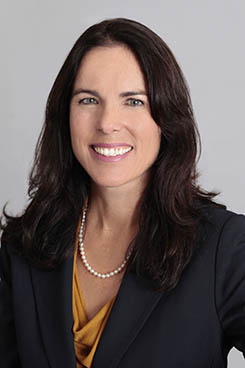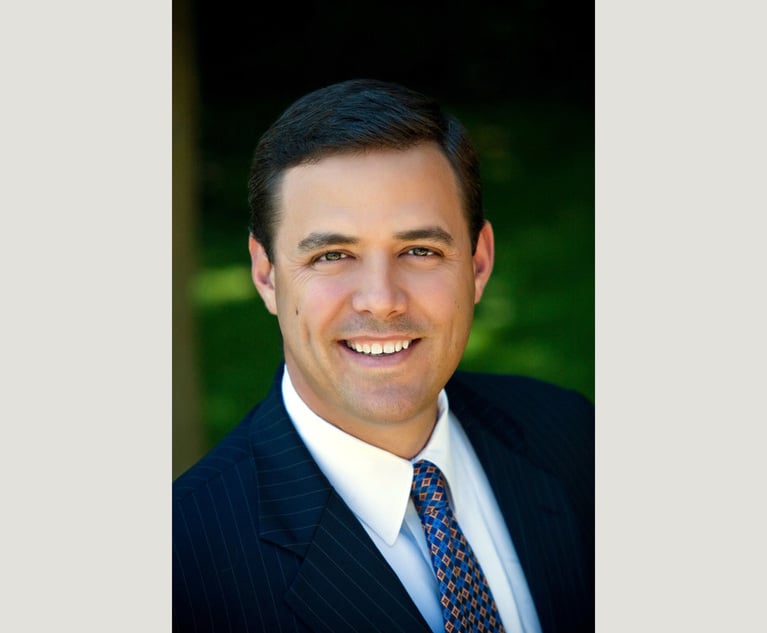Women Leaders in Tech Law 2018: Stephanie Skaff, Farella Braun + Martel
"The gender gap is alive and well, unfortunately," Skaff says. "Women are still underrepresented in technology and will continue to be underrepresented until we find more creative solutions to some existing problems."
November 12, 2018 at 07:25 PM
4 minute read
 Stephanie Skaff, Partner, Farella Braun + Martel (Courtesy photo)
Stephanie Skaff, Partner, Farella Braun + Martel (Courtesy photo)
In trade secrets and intellectual property litigation over the design and construction of a $200 million Facebook data center in Sweden, Stephanie Skaff helped net a confidential settlement with Facebook for her client BladeRoom Group Ltd. Following a 20-day trial against co-defendant Emerson Electric Co., a jury awarded BladeRoom a $30 million judgment in May.
Name a lawyer whose work you admire and why.
Annette Hurst. Annette is whip-smart and fearless. She not only has a commanding presence in the courtroom, she also finds time to use her talents to contribute to the nonprofit legal community and to the national debate on important social and political issues.
What's the best part about working in the tech sector?
Everything changes rapidly, so I'm always learning something new.
What's the biggest challenge?
Everything changes rapidly, so I'm always learning something new.
What piece of advice do you give to lawyers considering a career in tech law?
Don't just represent your clients … partner with them. Tap into their expertise and resources, collaborate together, and develop trusted relationships. Forging real partnerships with your clients will not only make your work more satisfying and fun, it will bring you better results than you can ever achieve on your own.
What's one way technology has made your life easier?
I can work from anywhere in the world.
One way it's made your life more difficult?
Technology definitely has changed the pace of the profession and made carving out family and personal time more challenging.
Name an important opportunity you got early in your career and what you did with it.
My first day at Farella, I was staffed on a case that was starting a jury trial. I ended up being tasked with reviewing the daily transcripts for possible post-trial legal motions. I found several creative legal issues and ended up writing a winning judgement notwithstanding verdict. A fortunate (and very fun) start to a long career!
What's the best piece of career advice anyone ever gave you?
Judges are people. Clients are people. Witnesses are people. Your colleagues are people. And even those frustrating lawyers on the other side of the case are people. The better you understand, communicate and work with people, the better trial lawyer you will be.
Number one survival tip in a work crisis:
Breathe and keep things in perspective.
In 50 words or less, how far has the tech industry gone toward tackling its gender gap since you started practicing?
The gender gap is alive and well, unfortunately. Women are still underrepresented in technology and will continue to be underrepresented until we find more creative solutions to some existing problems, including the lack of a robust pipeline of female STEM students and a work environment that continues to erect significant barriers to career advancement for women.
What's one way you've had to change your thinking toward practicing law to succeed with tech industry clients?
I no longer think of myself as just a litigator or a trial lawyer; I think of myself as a trusted partner to my clients. I know my clients are looking for the quickest, most creative and cost- effective solution to their existing disputes. Finding that solution requires understanding the client's business and key objectives really well. Asking the right questions and listening carefully from the beginning of an engagement is critical.
What's one area of technology that you're most excited about and why?
The rapid developments in artificial intelligence are exciting not only from a technology perspective, but it also because AI doesn't fit neatly into the traditional confines of our existing intellectual property laws. AI will require a re-examination of the very foundation of how we define and own intellectual property. (e.g. If an invention is created by a machine, is it patentable? If code is written by a machine, who is the author?)
This content has been archived. It is available through our partners, LexisNexis® and Bloomberg Law.
To view this content, please continue to their sites.
Not a Lexis Subscriber?
Subscribe Now
Not a Bloomberg Law Subscriber?
Subscribe Now
NOT FOR REPRINT
© 2025 ALM Global, LLC, All Rights Reserved. Request academic re-use from www.copyright.com. All other uses, submit a request to [email protected]. For more information visit Asset & Logo Licensing.
You Might Like
View All
How I Made Office Managing Partner: 'Stay Focused on Building Strong Relationships,' Says Joseph Yaffe of Skadden

US Patent Innovators Can Look to International Trade Commission Enforcement for Protection, IP Lawyers Say

How the Deal Got Done: Sidley Austin and NWSL Angel City Football Club/Iger

How Uncertainty in College Athletics Compensation Could Drive Lawsuits in 2025
Trending Stories
- 1SDNY Criminal Division Deputy Chief Returns to Debevoise
- 2Brownstein Adds Former Interior Secretary, Offering 'Strategic Counsel' During New Trump Term
- 3Tragedy on I-95: Florida Lawsuit Against Horizon Freight System Could Set New Precedent in Crash Cases
- 4Weil, Loading Up on More Regulatory Talent, Adds SEC Asset Management Co-Chief
- 5Big Banks Did Great Last Year. What Does That Mean for Big Law?
Who Got The Work
J. Brugh Lower of Gibbons has entered an appearance for industrial equipment supplier Devco Corporation in a pending trademark infringement lawsuit. The suit, accusing the defendant of selling knock-off Graco products, was filed Dec. 18 in New Jersey District Court by Rivkin Radler on behalf of Graco Inc. and Graco Minnesota. The case, assigned to U.S. District Judge Zahid N. Quraishi, is 3:24-cv-11294, Graco Inc. et al v. Devco Corporation.
Who Got The Work
Rebecca Maller-Stein and Kent A. Yalowitz of Arnold & Porter Kaye Scholer have entered their appearances for Hanaco Venture Capital and its executives, Lior Prosor and David Frankel, in a pending securities lawsuit. The action, filed on Dec. 24 in New York Southern District Court by Zell, Aron & Co. on behalf of Goldeneye Advisors, accuses the defendants of negligently and fraudulently managing the plaintiff's $1 million investment. The case, assigned to U.S. District Judge Vernon S. Broderick, is 1:24-cv-09918, Goldeneye Advisors, LLC v. Hanaco Venture Capital, Ltd. et al.
Who Got The Work
Attorneys from A&O Shearman has stepped in as defense counsel for Toronto-Dominion Bank and other defendants in a pending securities class action. The suit, filed Dec. 11 in New York Southern District Court by Bleichmar Fonti & Auld, accuses the defendants of concealing the bank's 'pervasive' deficiencies in regards to its compliance with the Bank Secrecy Act and the quality of its anti-money laundering controls. The case, assigned to U.S. District Judge Arun Subramanian, is 1:24-cv-09445, Gonzalez v. The Toronto-Dominion Bank et al.
Who Got The Work
Crown Castle International, a Pennsylvania company providing shared communications infrastructure, has turned to Luke D. Wolf of Gordon Rees Scully Mansukhani to fend off a pending breach-of-contract lawsuit. The court action, filed Nov. 25 in Michigan Eastern District Court by Hooper Hathaway PC on behalf of The Town Residences LLC, accuses Crown Castle of failing to transfer approximately $30,000 in utility payments from T-Mobile in breach of a roof-top lease and assignment agreement. The case, assigned to U.S. District Judge Susan K. Declercq, is 2:24-cv-13131, The Town Residences LLC v. T-Mobile US, Inc. et al.
Who Got The Work
Wilfred P. Coronato and Daniel M. Schwartz of McCarter & English have stepped in as defense counsel to Electrolux Home Products Inc. in a pending product liability lawsuit. The court action, filed Nov. 26 in New York Eastern District Court by Poulos Lopiccolo PC and Nagel Rice LLP on behalf of David Stern, alleges that the defendant's refrigerators’ drawers and shelving repeatedly break and fall apart within months after purchase. The case, assigned to U.S. District Judge Joan M. Azrack, is 2:24-cv-08204, Stern v. Electrolux Home Products, Inc.
Featured Firms
Law Offices of Gary Martin Hays & Associates, P.C.
(470) 294-1674
Law Offices of Mark E. Salomone
(857) 444-6468
Smith & Hassler
(713) 739-1250






